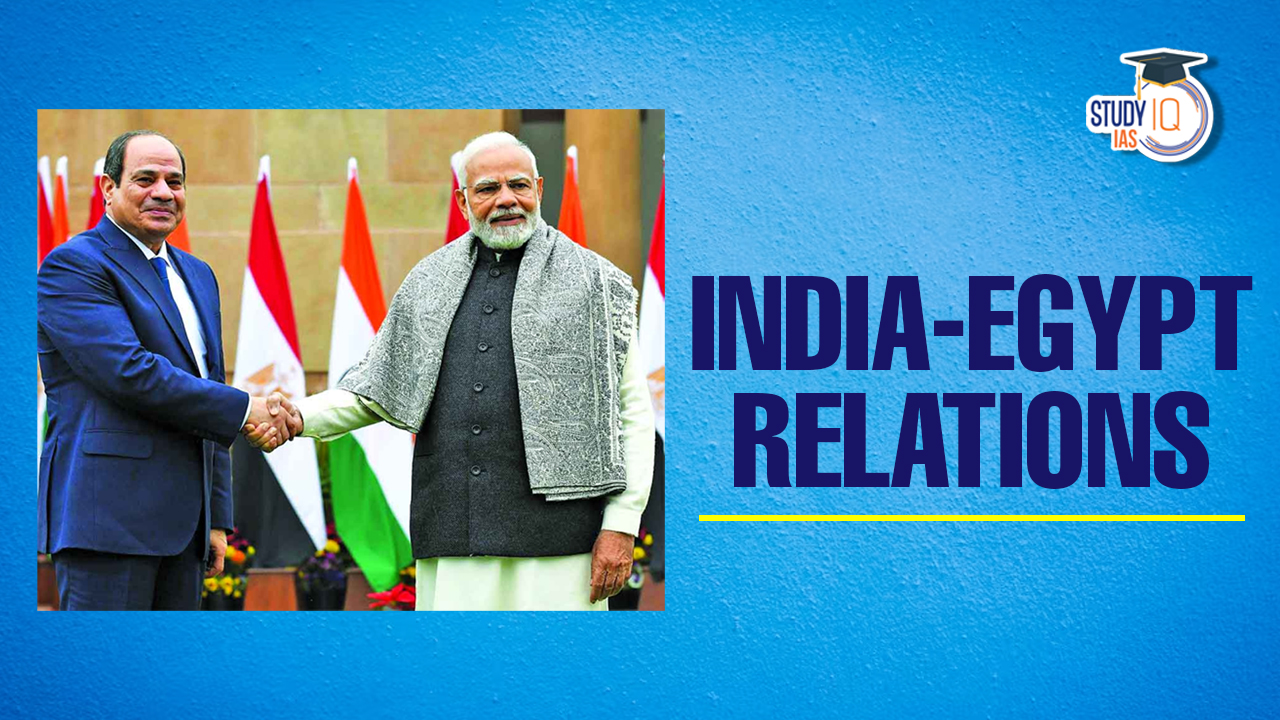Table of Contents
Context: The Indian Prime Minister will pay a state visit to Egypt shortly, at the invitation of President Abdel Fattah el-Sisi.
More on the News
- The Prime Minister’s visit marks an important milestone as it is not only his first trip to Egypt but also the first official bilateral visit by an Indian Prime Minister to the country since 1997.
- Previous visits between India and Egypt have predominantly been for multilateral events, making the current visit significant in terms of strengthening bilateral ties.
- The Prime Minister will pay a visit to the 11th-century Al-Hakim Mosque during his visit.
- The mosque was meticulously restored with the help of the Dawoodi Bohra community, emphasising the spirit of collaboration and cultural exchange.
- Also, he will pay a visit to the Heliopolis War Cemetery to pay tribute to the valiant Indian soldiers who made the ultimate sacrifice for Egypt during World War I.
India- Egypt Ties
Evolution of Relations:
The evolution of ties between India and Egypt has a deep historical foundation, dating back to ancient times.
- Ancient Civilizational Links: The oldest civilizational link between India and Egypt, dates back to 2750 BCE when the Pharaoh Sahure sent ships to the “Land of Punt,” identified with peninsular India. Additionally, Egyptian mummies were wrapped in Indian muslin dyed with indigo during the second millennium BCE.
- Diplomatic Relations: Mahatma Gandhi and Egyptian revolutionary Saad Zaghloul shared a common goal of independence from British colonial rule. India and Egypt announced the establishment of diplomatic relations at the ambassadorial level just three days after India gained independence.
- Friendship Treaty: In 1955, a Friendship Treaty was signed between Indian Prime Minister Jawaharlal Nehru and Egyptian President Gamal Abdel Nasser. This period coincided with the emergence of the Non-Aligned Movement, which both countries actively participated in.
- Recent Intensification: Since 2014, there has been an increased focus on political cooperation between India and Egypt. The heads of both sides met on the side-lines of the UNGA in 2015, discussing counterterrorism, economic engagement, and regional issues.
- Strategic Partnership: The relationship between India and Egypt has witnessed an upswing in recent years. President el-Sisi was the chief guest at India’s 74th Republic Day parade in 2023, and during the meeting, both countries agreed to elevate their bilateral relationship to a “strategic partnership.”
- Bilateral Agreements: India and Egypt have signed various agreements to enhance cooperation in different sectors. For example, they signed a Memorandum of Understanding (MoU) between Prasar Bharati and the National Media Authority of Egypt to facilitate content exchange and co-productions.

Areas of Cooperation:
The areas of cooperation between India and Egypt cover various fields, including political relations, economic ties, development assistance, science and technology, defence relations, cultural exchanges, and the Indian community in Egypt.
- Political Relations:
- The establishment of diplomatic relations between India and Egypt at the Ambassadorial level was announced jointly in 1947.
- The two countries have maintained close cooperation in multilateral fora and were among the founding members of the Non-Aligned Movement.
- During the COVID-19 pandemic, Egypt demonstrated solidarity with India by dispatching three planes carrying medical supplies in 2021.
- Additionally, the Embassy of India signed an agreement to procure 300,000 doses of REMDESEVIR from M/s EVA Pharma, an Egyptian pharmaceutical company.
- The year 2022 holds particular significance as it commemorates the 75th anniversary of diplomatic relations between India and Egypt, highlighting the longstanding ties between the two countries.
- Operation Sankalp serves as an example of India’s expanded role in the region. It involved the Indian Navy escorting oil tankers through the Strait of Hormuz during escalating tensions between Saudi Arabia and Iran, showcasing India’s commitment to protecting national assets and interests.
- Economic Relations:
- Since March 1978, the India-Egypt Bilateral Trade Agreement has been in effect, operating under the Most Favoured Nation clause.
- In the fiscal year 2018-19, the bilateral trade reached a value of US$ 4.55 billion.
- Despite the challenges posed by the pandemic, the volume of trade only experienced a slight decline to US$ 4.5 billion in 2019-20 and further decreased to US$ 4.15 billion in 2020-21.
- Notably, the bilateral trade between India and Egypt reached a record high of US$ 7.26 billion in the fiscal year 2021-22.
- The trade relationship between the two countries has been characterized by a fairly balanced trade flow, with Indian exports to Egypt amounting to US$ 3.74 billion, while imports from Egypt to India totalled US$ 3.52 billion.
- Development Assistance:
- The grants-in-aid projects include: Pan Africa Tele-medicine and Tele-education project in Alexandria University, Solar electrification project in Agaween village and Vocational Training Centre for textile technology in Shoubra, Cairo, which have been completed.
- Technical cooperation and assistance have been a major part of our bilateral relationship. Since 2000, over 1250 Egyptian officials have benefited from ITEC and other programs like ICCR and IAFS scholarships.
- In the field of scientific cooperation, ICAR and the Agricultural Research Centre of Egypt are working in the field of agricultural research.
- Science and Technology:
- ‘Science & Technology’ cooperation is implemented through biennial Executive Programmes and Scientific Cooperation Programme between CSIR (India) and NRC (Egypt).
- The 2nd ISRO-NARSS JWG was held in Cairo in 2017.
- The India-Egypt Workshops on Agriculture-Biotechnology and Nanotechnology were held in Shillong in 2018 and in Mumbai in 2019 respectively.
- An IT Centre in Al Azhar University, CEIT, is also operational since February 2019.
- Defence Relations:
- During the 1960s, there was a significant level of cooperation between the Air Forces of India and Egypt, including joint efforts to develop a fighter aircraft. Egyptian pilots received training from Indian Air Force (IAF) pilots during this period, with the training continuing until 1984.
- The Joint Defence Committee (JDC) plays a crucial role in shaping the current defence cooperation between India and Egypt.
- The 8th JDC took place in New Delhi in 2018, followed by the 9th JDC held in Cairo in 2019.
- Egypt actively participated in the Multinational Training Exercise held in Pune, India, in 2019, which involved friendly African countries. Furthermore, in 2021, the first-ever joint tactical air exercise named “Desert Warrior” took place between the Indian Air Force (IAF) and the Egyptian Air Force (EAF).
- In January 2023, a groundbreaking joint exercise called “Exercise Cyclone-I” commenced at Jaisalmer in Rajasthan, involving the special forces of both the Indian Army and the Egyptian Army.
- Cultural Relations: The Maulana Azad Centre for Indian Culture (MACIC) in Egypt promotes cultural cooperation through activities such as language classes, seminars, film shows, exhibitions, and participation in local cultural events. The “Sawt-ul-Hind” magazine highlights the strong bond and vibrant cultural exchanges between the two countries.
- Indian Community: The Indian community in Egypt, numbering around 3,200, plays a significant role in cultural and people-to-people exchanges. Concentrated mainly in Cairo, the community contributes to fostering closer ties between India and Egypt.
Opportunities and Challenges
Opportunities for India-Egypt Relations:
- Economic Potential: Egypt’s large population and economy present opportunities for India to supply key imports such as refined petroleum, wheat, cars, corn, and pharmaceuticals. India has the potential to meet Egypt’s demand in these areas.
- Infrastructure Development: The Egyptian government has an ambitious infrastructure development agenda, with 49 mega projects including the construction of a New Cairo ($58 billion), a $25 billion nuclear power plant and a $23 billion high-speed rail network. These provide opportunities for India to participate in the projects and contribute its expertise.
- Arms and Defence Cooperation: Egypt’s status as the world’s third-largest arms importer during 2015-19 creates opportunities for India to enhance defence cooperation and engage in arms trade with Egypt.
Challenges for India-Egypt Relations:
- Economic Crisis: The Egyptian economy is facing significant challenges, including a static economy, pandemic-related impacts, global slowdown, and the Ukraine conflict. These factors have led to a drop in tourism, increased import costs, high inflation (surpassed 30%), and a depreciating currency (more than 50% since February 2022). India would need to navigate these economic challenges to strengthen bilateral trade and investment.
- Financial Constraints: Egypt’s huge financial commitments, coupled with a substantial foreign debt and negative net foreign assets, have led to foreign exchange scarcity. This situation has resulted in deferred payments for essential imports like wheat.
- Although a $3 billion bailout package was recently secured from the International Monetary Fund, its implementation is contingent upon challenging economic reforms.
- However, the progress of these reforms has been hindered by entrenched interests and the prevalence of crony capitalism.
- Reluctance of Gulf Arab States: The affluent Gulf Arab states initially supported the Egyptian economy with nearly $30 billion, but have been lately reluctant citing various governance issues in Egypt.
- Egypt’s foreign debt is over $163 billion (43% of the GDP) and its net foreign assets are minus $24.1 billion.
- The acute forex situation compelled the government to issue in January 2023 an order for the postponement of projects with a large foreign currency component and cuts to non-essential spending.
- Geopolitical challenges: China’s bilateral trade with Egypt is currently at $15 billion, double that of India’s $7.26 billion in 2021-22.


 World Population Day 2025, Themes, Histo...
World Population Day 2025, Themes, Histo...
 What are Polycyclic Aromatic Hydrocarbon...
What are Polycyclic Aromatic Hydrocarbon...
 Marlin Fish: Species, Features, Appearan...
Marlin Fish: Species, Features, Appearan...





















